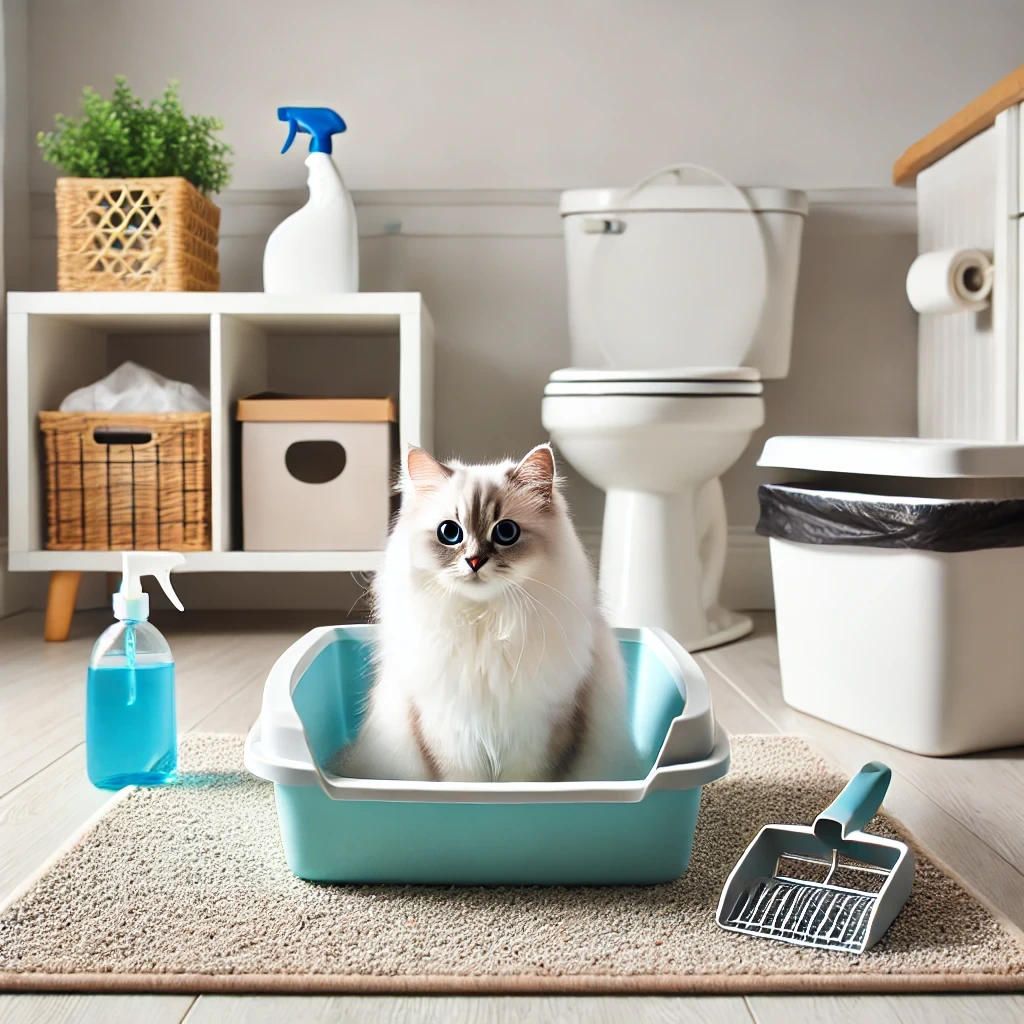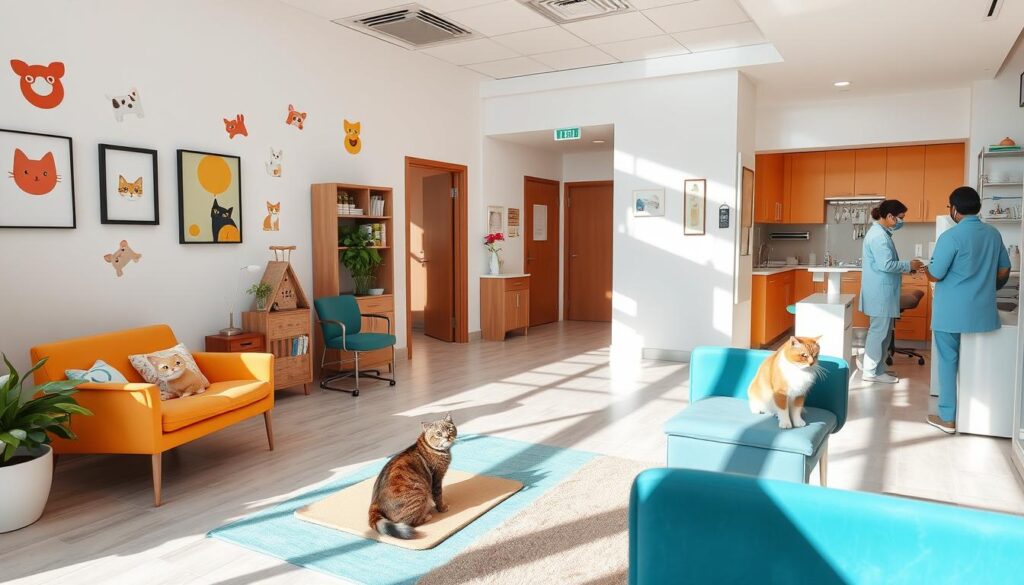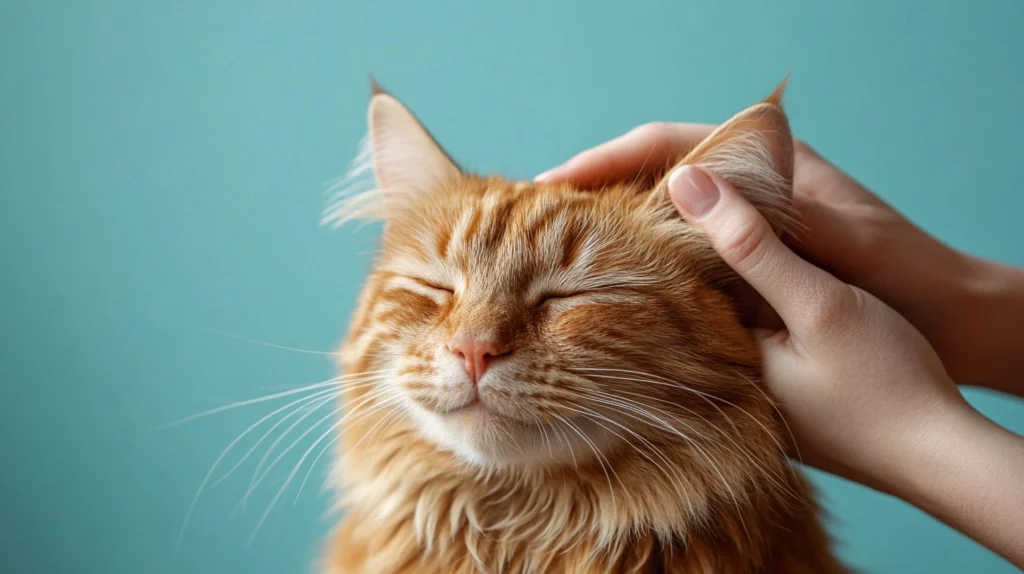Being a cat parent means your pet is a valued family member. Cats need routine and structure to be happy. They have their own daily habits, like hunting and sleeping.
Your job is to create a care routine that fits their natural ways. This ensures they live a healthy, active, and happy life.
This guide will show you how to keep your cat happy and healthy. You’ll learn about preventive care and making their environment fun. Get ready to improve your bond with your furry friend.
Grooming Routines and Regular Health Care
Keeping up with grooming is key for your cat’s health. How often to bathe and brush depends on their fur and needs. Regular grooming and vet visits help keep your cat clean, healthy, and shedding less.
Baths: As Needed
Cats usually clean themselves, so baths are rare. But, if their fur is dirty or they have skin problems, a bath is needed. Your vet might suggest medicated baths to treat these issues.
Fur Brushing: Daily or Weekly
Brushing is vital for your cat’s coat and to prevent hairballs. Long-haired cats need daily brushing to manage their fur. Short-haired cats should be brushed weekly. Brushing keeps their coat shiny and healthy.
| Coat Type | Brushing Frequency |
|---|---|
| Long-haired | Daily |
| Short-haired | Weekly |
| Hairless | Weekly or as needed |
Regular grooming and health care are crucial for your cat’s well-being. Sticking to a routine keeps your cat happy and healthy.
Dental Care and Veterinary Check-ups
Keeping your cat’s teeth clean is key to their health. Brushing their teeth daily helps stop plaque and tartar from building up. Use cat-specific toothpaste and brush every day or every other day.
Don’t forget about annual dental exams and cleanings at the vet. These cleanings can remove plaque and polish your cat’s teeth better than brushing. Regular vet visits also help catch health problems early.
| Dental Care Recommendations for Cats | Frequency |
|---|---|
| Toothbrushing | Daily or every other day |
| Professional Dental Cleaning | Every 1-2 years, depending on your cat’s dental health |
| Veterinary Check-ups | Once or twice a year |
Regular vet visits are crucial for spotting dental issues like periodontal disease and tooth resorption. Good dental care prevents pain and keeps your cat comfortable while eating.
“Maintaining your cat’s dental health is one of the most important aspects of their overall well-being.”
Cat Care Tips: Structured Feeding Schedule
Keeping a regular feeding schedule is vital for your cat’s health. Cats love routine, and a set meal plan helps avoid picky eating. Adult cats should eat twice a day, with a 12-hour gap between meals.
A good cat nutrition plan mixes dry and wet food that meets AAFCO standards. Dry food helps their teeth, while wet food keeps them hydrated. It’s important to control portions to prevent weight gain.
Free-feeding, where food is left out all day, is not advised. It can cause weight problems as cats might eat too much without a schedule.
| Kitten Age | Feeding Frequency | Caloric Needs |
|---|---|---|
| Newborn to 4 weeks | Every 3-4 hours (6-8 times per day) | Nursing from mother |
| 4 to 8 weeks | Every 4-6 hours | – |
| 8 to 16 weeks | 3-4 meals per day | 60-65 calories/lb |
| 4 to 6 months | 3-4 small meals per day | 60-65 calories/lb |
| Adult | 2 meals per day | 24-35 calories/lb |
By sticking to a pet feeding schedule, you give your cat stability and healthy eating habits. Remember, each cat’s needs differ based on age, activity, and breed. Always check with your vet for the best feline diet and feeding plan for your cat.
Litter Box Care and Hygiene Practices
Keeping the litter box clean is key for your cat’s feline health and hygiene. Daily spot cleaning keeps it fresh. This reduces bacterial growth that can cause urinary tract infections (UTIs).
Litter Box Maintenance
To keep your cat’s litter box in top shape, follow these tips:
- Scoop out the litter box daily to remove clumps and waste.
- Clean and wash the litter box every 2 to 4 weeks, depending on litter type and household size.
- Use a mild, unscented detergent and dry the litter box before adding new litter.
- Avoid scented products near the litter box, as they can harm your cat.
- Don’t use abrasive cleaners with ammonia, bleach, or caustic ingredients, as they can scare your cat away.
It’s best to have one litter box per cat, plus an extra. This ensures a clean, comfy spot for litter box training. Automated litter boxes can cut down on daily work, but they need regular deep cleaning too.

“Proper cat hygiene starts with a well-maintained litter box. It’s a small investment that can pay off in a healthier, happier cat.”
By sticking to these litter box care and hygiene tips, you can create a clean, comfy space for your cat. This promotes overall feline health and happiness.
Exercise, Playtime, and Enrichment
Keeping your cat active and mentally sharp is key to their happiness. Using cat toys, cat games, and creating a fun feline exercise area is vital. It gives your cat the environmental enrichment they need.
Cats are most active at dawn and dusk. Try to play with your cat for 10-15 minutes, 2-3 times a day. Kittens and young cats might need more play, while older cats might enjoy longer sessions. Watch for signs from your cat to know when they’re ready to play or need a break.
- Avoid using your hands as toys to prevent play aggression and scratches
- Consider a cat harness and leash for supervised outdoor exploration
- Train your cat to perform tricks for a fun bonding experience
Offer a range of interactive toys to keep your cat interested. This includes puzzle feeders, electronic toys, wand toys, and catnip bubbles. Also, provide vertical spaces like window perches, cat trees, and exercise wheels. These encourage natural feline exercise behaviors like climbing, jumping, and running.
“Play is a significant indicator and promoter of a cat’s well-being,” according to a 2023 study published in the Animal Welfare journal.
Regular play and a stimulating environment are crucial for your indoor cat’s health. By adding these to your cat’s daily routine, you can keep them happy, healthy, and entertained.
Sleep: A Cat’s Routine
As pet owners, we know that our cats need plenty of sleep. Adult cats sleep about 12 to 16 hours a day. This shows how they naturally save energy.
As cats get older, they might sleep even more. This is just part of their life cycle.
Cats are most active at dawn and dusk. This can mess with our sleep. To fix this, play with your cat before bed. This helps them sleep better.
It’s key to watch for any big changes in your cat’s sleep. If they sleep too much, it could mean they’re sick. Always check with a vet if you notice anything odd.
Understanding feline sleep patterns and cat behavior helps us care for our pets better. This way, we make sure they get the pet health care they need.
| Sleep Patterns | Duration |
|---|---|
| Light sleep | 3/4 of total sleep time |
| Deep sleep | 1/4 of total sleep time |
| Adult cats (average) | 12-16 hours per day |
| Senior cats | More than younger cats |
Knowing about feline sleep patterns helps us keep our cats healthy. With the right routine, we can make sure they sleep well. This leads to better cat behavior and health.
Essential Pet Supplies for Cats
Keeping your cat happy and healthy starts with the right supplies. You’ll need top-notch cat food and treats, a comfy bed, and fun cat accessories. These items are key to a happy, active life for your cat.
Stocking Up
When picking out pet supplies for your cat, focus on a few important things. First, choose a cat food that meets your cat’s needs, whether they’re young, adult, or older. Adding cat treats that are both tasty and healthy can make playtime more exciting.
Every cat needs a cozy cat bed for rest. Also, get cat toys that encourage natural behaviors like hunting and exploring. This keeps them active and engaged.
Good feline health also means a clean litter box. Scoop it daily and clean it thoroughly often. Use unscented, clumping litter for your cat’s comfort and health.
For extra convenience, think about an automatic pet feeder and water fountain. They ensure your cat eats and drinks well, even when you’re not home.
Find vet-recommended pet supplies at SplootRX, a great online pet store with fast delivery. Customize your cat’s supplies to fit their needs and enjoy a happy, healthy pet.
| Essential Cat Supplies | Recommended Features |
|---|---|
| Cat Food | High-quality, nutrient-dense, and age-appropriate |
| Cat Treats | Healthy, delicious, and motivating for training |
| Cat Bed | Comfortable, cozy, and inviting for relaxation |
| Cat Toys | Stimulating, engaging, and satisfying natural instincts |
| Litter Box | Unscented, clumping litter for optimal cat health |
| Automatic Pet Feeder | Consistent food supply, even when owners are away |
| Water Fountain | Encourages proper hydration for cats |
Establishing a Routine: Veterinary Care
Regular vet visits are key for your cat’s health. They help vets check your cat’s health, give shots, and spot problems early. Getting an annual check-up and more as needed keeps your cat happy and healthy.
Sploot Veterinary Care is a trusted name for veterinary services. They offer primary and urgent care for pet health in a calm, fear-free place. Their clinics are open all year, with long hours, making it easy to schedule feline wellness visits.
- Wellness exams and preventive care, including vaccinations and parasite prevention
- Diagnosis and treatment of a wide range of health conditions
- Dental cleanings and oral care to maintain your cat’s dental health
- Spaying or neutering services to promote overall well-being
Having a regular vet care routine is key for cat owners. Working with a clinic like Sploot Veterinary Care ensures your cat gets the care they need to do well.
| Veterinary Service | Importance |
|---|---|
| Wellness Exams | Early detection of health issues, preventive care |
| Vaccinations | Protection against infectious diseases |
| Dental Care | Maintain oral health and prevent dental disease |
| Spay/Neuter | Prevent unwanted litters, reduce risk of certain diseases |

“Routine veterinary care is essential for the long-term health and well-being of our feline friends. By partnering with a trusted veterinary provider, cat owners can ensure their pets receive the comprehensive care they need to thrive.”
Conclusion
Following the essential cat care tips in this article will keep your cat healthy and happy. Regular vet visits, grooming, and a set feeding schedule are crucial. Also, make sure to provide physical and mental stimulation.
If your cat needs a check-up or vaccinations, Sploot Veterinary Care is a great choice. They have many locations and use fear-free techniques. This ensures your cat gets the care they need in a comfortable setting.
By focusing on your cat’s cat care tips, feline health, and well-being, you’ll make them happy for a long time. Giving your cat the right care and attention makes pet ownership rewarding for both of you.
FAQ
How often should I bathe my cat?
How often to bathe your cat depends on their lifestyle and comfort. Cats need baths if their fur is dirty or they have skin issues. For skin problems, baths might be needed weekly.
But, bathing too much can dry out their skin. This can lead to itchiness and other skin issues.
How often should I brush my cat’s fur?
Brushing your cat regularly helps remove loose hair and dander. It also reduces hairballs. Long-haired cats need daily brushing.
Short-haired cats should be brushed at least once a week.
How often should I brush my cat’s teeth?
Brushing your cat’s teeth daily helps prevent plaque and tartar. Use cat toothpaste and brush every day or every other day.
Annual dental exams and cleanings are also crucial. They help catch dental problems early and prevent serious issues.
How often should I feed my cat?
Feeding your cat twice a day helps them feel stable. It also prevents picky eating. Use a mix of dry and wet food that meets AAFCO standards.
Portion control is key to avoid weight issues. Free feeding is not recommended as it can lead to obesity.
How often should I clean the litter box?
Spot cleaning keeps the litter box fresh. It reduces bacterial growth that can cause UTIs. Scoop out the litterbox daily.
Change the litter and deep clean every 2 weeks or a month, depending on the litter and number of cats.
How often should I play with my cat?
Playing with your cat regularly keeps them active and mentally sharp. Aim for 1 – 2 play sessions a day, lasting a few minutes each.
Use cat toys, puzzle feeders, and games to keep them entertained. An enriching environment provides exercise whenever needed.
How much should my cat sleep?
Cats need plenty of sleep, around 12 to 16 hours a day. As they age, they may sleep more. Sudden lethargy could be a health issue.
Consult a vet if your cat sleeps more than usual.
How often should I take my cat to the vet?
Regular vet visits are key to a healthy cat. Schedule check-ups at least once a year. This helps catch diseases early.
Sploot Veterinary Care offers wellness exams and vaccinations. They use fear-free techniques to make cats feel comfortable.

